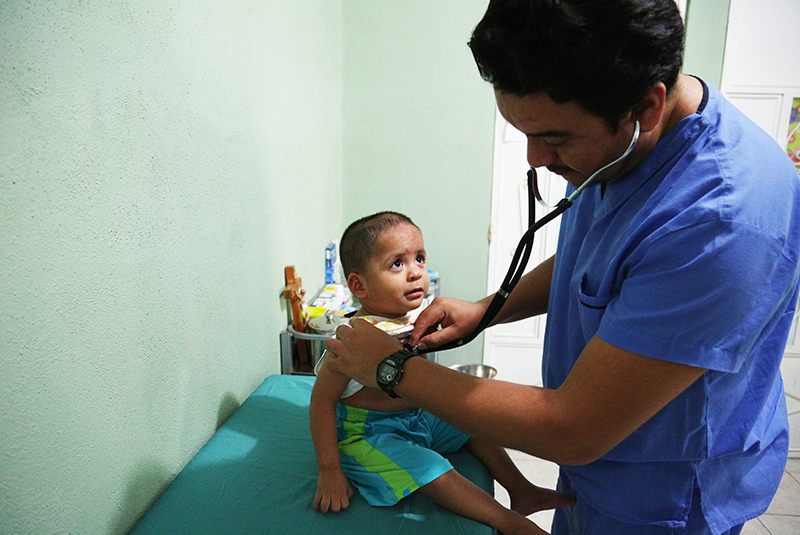In Guatemala, the chances of survival were slim for a sweet baby named Marcela because of ectopia cordis, a rare condition in which a baby is born with a heart partially or entirely outside the chest cavity.
Only 8 of every 1 million babies have ectopia cordis, and 90 percent die within three days of birth. Not only did Marcela have this rare condition, but her heart had a structural problem, and a weakness in her abdomen caused her organs to protrude through her belly button.
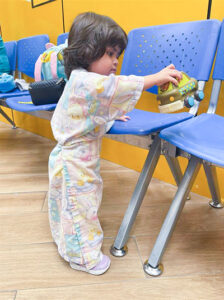
Her mother, Isabel, feared her little girl would die. There were no doctors in Guatemala qualified to perform the complex surgery to place Marcela’s heart inside her body.
The necessary hospital care would involve two long and complicated surgeries that were quite expensive. Marcela’s parents, who make about $450 a month, could never afford to fly to the United States to obtain the surgery to save their daughter.
This is why Food For The Poor established the Benevolent Fund. Through caring people who contribute to the medical care fund, the lives of innocents like Marcela are saved.
Marcela and her mother were flown to Boston Children’s Hospital in Massachusetts for her two lifesaving surgeries.
What is the biggest challenge for impoverished children needing medical care?
Children in developing countries face unique challenges – and one of the biggest challenges is access to medical care. Childhood illnesses easily treated every day in the United States can wreak havoc on children living in poverty in countries such as Haiti or Guatemala.
The odds are stacked against children without access to medical care. When a child is stricken with a critical medical condition, oftentimes there isn’t a doctor qualified to treat it.
In Haiti and Guatemala, accessing quality health care is especially challenging. Haiti is the most impoverished country in Latin America and the Caribbean.
Guatemala has one of the world’s highest rates of child malnutrition, a number that runs as high as 80 percent in rural villages, according to the United Nations Children’s Fund.
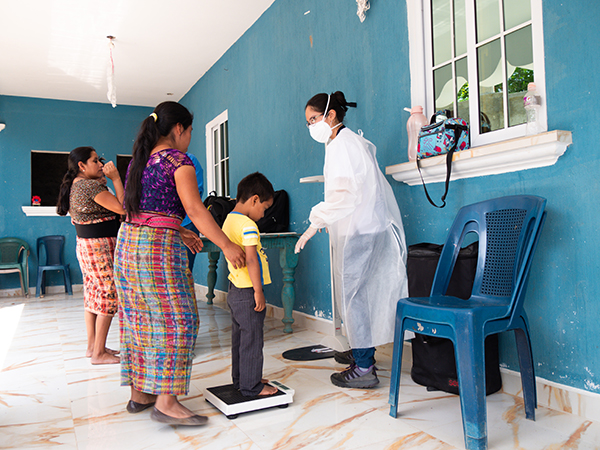
What are barriers to accessing medical care for children in need?
The biggest barrier for impoverished children to access medical care isn’t the cost of seeing a doctor. It’s finding a qualified doctor, especially for parents living in poverty in remote areas.
The World Health Organization (WHO) recommends a country having at least 4.45 physicians, midwives and nurses per 1,000 people. However, according to the Pan American Health Organization/WHO Health in the Americas Haiti country report in 2018, the public and private sectors in Haiti are severely lacking in medical personnel.
- Haiti Public Sector: 1.4 physicians and 1.8 nurses per 10,000 people
- Haiti Private Sector: 1 physician and 2.1 nurses per 10,000 people
In remote villages, affordable transportation to get to available medical care is beyond reach. Some wealthier Haitians can access medical care for their children by flying to Cuba or the United States for medical care for their children.
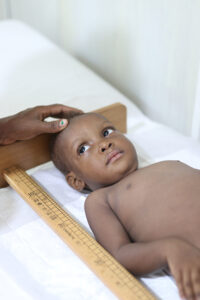
“Just to get medical care, some people have to travel far from home if they live in remote areas,” said Thamarah Lindor, a doctor who practiced medicine in remote northern areas of Haiti near Cap-Haitien. “When they arrive at the hospital or clinic, the cost of seeing a doctor is often too expensive.”
Born in Haiti and educated in the Dominican Republic, Dr. Lindor said since the cost of seeing a doctor is too expensive for Haitians living in poverty, they will often go without any kind of care.
Going without treatment means when their children fall ill, they rely on folk remedies such as plants or leaves.
Medical care is sought only when the children get extremely ill.
“If not treated, a simple upper respiratory infection can be deadly for a child living in a poor environment,” Dr. Lindor said. “But if there is no doctor close by, the parents may not have the money to travel for four hours by taxi or bus. So they go without treatment or use folk remedies.”
With its rugged mountains and remote areas that are home to several indigenous populations, Guatemala faces several challenges in providing medical care to its people. Research shows Guatemala also has little medical care available for people who live in areas outside the capital or in larger cities.
Basic health care is difficult to obtain in Guatemala; in fact, simple health services meet only 54% of the needs of those living in the country. (Source: Centers for Disease Control and Prevention)
Access to medical care for impoverished children saves lives
In countries like Haiti, even a simple childhood ailment such as diarrhea can turn deadly because proper medical treatment isn’t sought, either due to cost or the difficulty of the journey to see a physician, or both.
During Haiti’s deadly cholera epidemic in 2010, more than 820,000 cases of cholera were reported and almost 10,000 people died, including many children, the CDC reported.
Since diarrhea, a symptom of cholera, is a common ailment in destitute Haitian communities, some parents did not seek treatment until it was too late.
To address this crisis, Food For The Poor’s Haiti office installed water treatment systems in several areas to prevent the spread of cholera, and teamed with Bernard Mevs hospital in the capital city of Port-au-Prince, giving doctors resources needed to treat the disease.
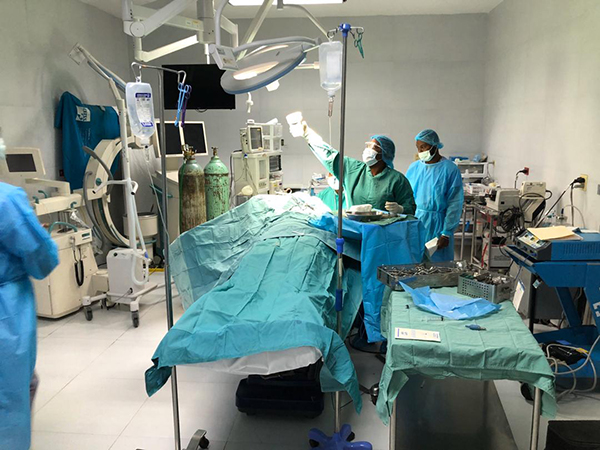
How does poverty and location limit access to medical care?
An outbreak of disease is less common than the everyday challenges faced by families living in poverty. The World Health Organization cites an hour of traveling time as its definition to having adequate access to medical facilities.
In Guatemala alone, many children in impoverished communities live much further than an hour’s drive from the closest medical facilities. In remote villages, only 36 percent of children have easy access to medical treatment at a facility, compared to children living in cities, according to the World Bank. “The main challenge is lack of medical services, be it infrastructure or just not having doctors or nurses around. More often than not, patients would have to travel several miles to a clinic or hospital,” said Eli Kuan, Food For The Poor project manager for Guatemala.
How can you improve problems with access to medical care?
There is hope, and there are solutions for such cases.
Food For The Poor helps to address challenges in access to care by constructing community centers in remote areas. These community centers include an equipped clinic or existing clinics are remodeled.
These clinics then have doctors scheduled to visit on certain days that are coordinated by the charity’s in-country partners, Kuan said.
The same solution exists in Haiti, where Food For The Poor operates a medical clinic on the grounds of the warehouse, and helps clinics in rural areas of the country.
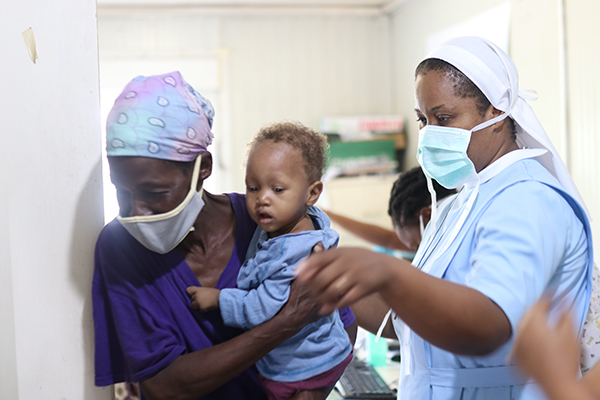
For children with complicated health conditions, there may not even be a physician anywhere in the country who can treat their medical illnesses. In extreme cases, such as that of baby Marcela in Guatemala, lifesaving surgery must be performed in the United States.
Food For The Poor’s Benevolent Fund saves a precious life
Caring people coming together can save lives in extraordinary ways, which is what happened with Marcela.
Marcela had surgery in Boston when she was 9 months old.
The first surgery corrected the structural defect in her heart. Doctors wanted her to gain weight and become stronger before performing the second surgery. A protective shield was placed around her heart until the second operation could be performed. She and her mother, Isabel, returned home, and then returned to Boston for the second operation a year later.
Thanks to all the donors who contributed to Food For The Poor’s Benevolent Fund, today Marcela is a happy baby growing strong at her home in Guatemala.
“She has been stable. She is developing like a girl her age, without complications,” said Dr. Paula Ruiz, Marcela’s pediatrician in Guatemala.
Marcela’s mother looks forward to braiding her hair and sending her off to school when she grows older.
“I am so grateful to God and all of the people helping us,” Isabel said. “I cannot find the words to express my gratitude and how I feel … with God’s help, anything is possible.”
You can make a difference today
You can make a difference in the lives of impoverished children who need critical medical care like Marcela did.
A donation to Food For The Poor’s Benevolent Fund provides medical care for children who have nowhere else to turn. Deliver hope through our Benevolent Fund to help save a life and give children the quality medical care they need.
